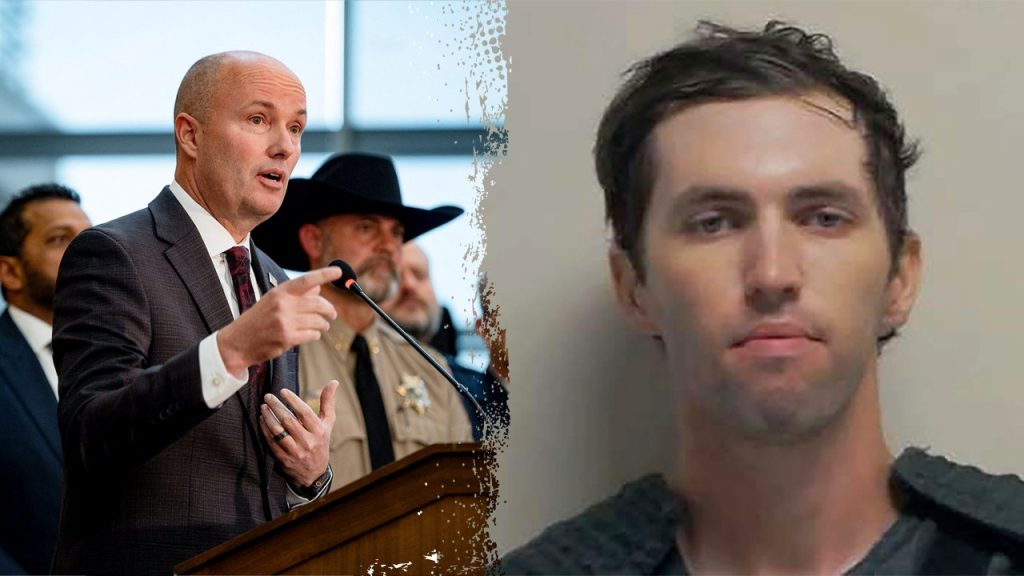A Nation Divided: The Aftermath of Charlie Kirk’s Assassination
In a dramatic conclusion to a 33-hour manhunt, law enforcement officials arrested 22-year-old Tyler Robinson, the man accused of assassinating conservative activist Charlie Kirk at Utah Valley University. The arrest brought a sense of relief to a nation reeling from what Utah Governor Spencer Cox explicitly called a “political assassination.” This tragedy has not only devastated those close to Kirk but has ignited intense debate about political violence in America and raised profound questions about how our justice system handles such cases. As investigators piece together the events that led to Kirk’s death, a community grapples with loss while political figures and citizens alike contemplate what this means for the future of American political discourse.
The investigation moved swiftly, with authorities using surveillance footage from the university stadium along with tips from Robinson’s family and friends to identify and apprehend him. At a news conference following the arrest, Governor Cox declared, “We got him,” promising that charges would be filed “soon” and that Robinson would be “held accountable” for Kirk’s death. Beyond the immediate case, Cox framed the killing in broader terms: “This is certainly about the tragic death, assassination, political assassination of Charlie Kirk, but it is also much bigger than an attack on an individual. It is an attack on all of us. It is an attack on the American experiment.” These words reflect the gravity with which officials are treating this case – not just as a murder, but as an assault on democratic values and political freedom.
The legal proceedings against Robinson are now under intense scrutiny, with both President Trump and Governor Cox publicly calling for prosecutors to pursue the death penalty. Robinson is currently being held at Utah County Jail, with a probable cause affidavit listing potential charges including aggravated murder, felony discharge of a firearm causing serious injury, and obstruction of justice. Under Utah law, prosecutors can only seek capital punishment in cases of “aggravated murder” – defined as a murder that knowingly “created a great risk of death” to another person besides the victim or defendant. If they choose to pursue this path, they must file a specific notice of intent within 60 days after Robinson’s arraignment, triggering a complex legal process including a two-part trial to determine both guilt and whether the death penalty is warranted. Without such filing, the maximum sentence would be life imprisonment without parole.
The public pressure for capital punishment in this case stands in stark contrast to Utah’s recent history with the death penalty. Though Utah is one of 27 states that still permits capital punishment – and one of just five where execution by firing squad remains legal – such sentences are rarely pursued. The state has carried out only two executions in the past twenty years, with inmates spending an average of 34 years on death row. Currently, only four men sit on Utah’s death row, each having been there for decades. This historical reluctance to implement the death penalty may conflict with the political pressure building in Robinson’s case, particularly given President Trump’s personal connection to Kirk, whom he described as “like a son” and “the finest person” while explicitly calling for the death penalty.
Kirk’s assassination has reopened painful wounds in America’s political landscape, forcing many to confront the increasingly dangerous polarization of our public discourse. The limited information released about the killing has left the public with more questions than answers, while lawmakers from across the political spectrum have begun to examine their own rhetoric and its potential consequences. Some have called for a reduction in inflammatory language, while others have pointed to this tragedy as evidence of deeper ideological conflicts within American society. The shock of Kirk’s death – a prominent conservative voice silenced by violence – has created a moment of national reflection about the nature and limits of political disagreement in a democratic society.
As Governor Cox noted, “History will dictate if this is a turning point for our country, but every single one of us gets to choose right now if this is a turning point for us.” These words encapsulate the crossroads at which America now stands. Kirk’s assassination, Robinson’s capture, and the forthcoming trial will undoubtedly attract intense national attention, particularly from President Trump and his allies. But beyond the specifics of this case lies a broader question about how Americans engage with those with whom they disagree. Will this tragedy drive people further apart, or will it prompt a collective recommitment to respectful democratic engagement? The answer may determine not just Robinson’s fate but the future health of America’s political culture and the safety of those who participate in it.














